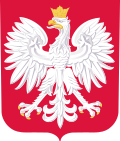You can help expand this article with text translated from the corresponding article in Polish. (October 2019)Click [show] for important translation instructions.
|
This article needs additional citations for verification .(December 2009) |
National League Liga Narodowa | |
|---|---|
| Abbreviation | LN |
| President | Zbigniew Lipiński (LN, 2013–2023) |
| Chairperson | Bogusław Kowalski (RLN, 2007–2011) |
| Founded | January 11, 2007; as Ruch Ludowo-Narodowy(National People's Movement) |
| Dissolved | February 6, 2023 |
| Headquarters | Jerusalem Ave. 83, 02-001 Warsaw, Poland |
| Ideology | National Democracy (Poland), Euroscepticism, Economic solidarism |
 |
|---|
The National League (Polish : Liga Narodowa, LN), formerly the National People's Movement (Polish: Ruch Ludowo-Narodowy, RLN) until 2013, was a minor Polish political party founded on 11 January 2007.
Contents
Starting in 2019, the party was a part of Konfederacja Wolność i Niepodległość, a nationalist, conservative and monarchist coalition of parties.
The party was deregistered in 2023 for failing to submit financial statements for 2021. [1]